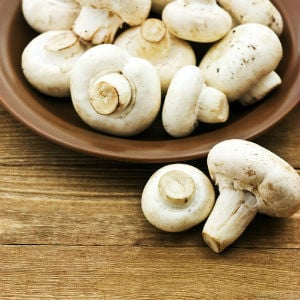
Feast on fungi
With names ranging from the exotic (think shiitake, enoki, chanterell, porcini) to the plain (button mushrooms, anyone?), mushrooms come in a vast array of shapes, colours and textures.
What's more, they’re grown in the dark in heaps of manure and sprout up almost overnight. This probably explains why, before their benefits and great taste were fully explored, some people were reluctant to eat them and associated them with witchcraft and superstition.
And indeed, mushrooms do hold a fascination due to their potentially poisonous nature. “While some are edible, some are deadly poisonous and others are believed to have magical or hallucinogenic properties,” writes the Northern Ireland Fungus Group, which promotes the conservation of mushrooms in Ireland.
Read: 'Magic mushroom' may be beneficial
Foraging for mushrooms in the wild is best left to the experts, but these days supermarkets and farmers’ markets have an abundance of these delicious fungi readily available.
Autumn and winter are ideal for enjoying a bounty of mushrooms, one of nature's superfoods. So, brush up on the facts and take the time to experiment with these fabulous fungi.
Fast fungus facts
Nutritional experts across the globe seem to agree that mushrooms are packed full of nutritional benefits. “I often encourage people to eat them because they’re a particularly good source of B vitamins and minerals (e.g. iron and potassium), while being low in energy,” says dietician Shana Terhart.
Foods with a low energy value provide fewer calories per gram than foods with a higher energy density, which means you can eat more of them without worrying about piling on the kilos.
Terhart notes that some of the important B vitamins found in mushrooms include:
- B3 (niacin), which is important for reducing bad LDL cholesterol and promoting good HDL cholesterol levels.
- B5 (pantothenic acid), which helps to synthesise cholesterol.
- B9 (folate), which is great for the formation and maturation of red and white blood cells. “More red and white blood cells mean stronger immunity, which particularly serves pregnant women well,” says Terhart. “A folate intake in pregnant women can reduce the risk of serious birth defects such as neural tube defects and a cleft palate. This intake is needed in the early stages, usually in the first 28 days of pregnancy.”
- Biotin, which supports the health of the skin, nerves, digestive tract, metabolism and cells. According to WebMD.com, pregnant women also sometimes have low biotin levels.
Other benefits of mushrooms, offered by Power of Mushrooms, include the following:
- When exposed to sunlight, mushrooms generate vitamin D – a powerful nutrient that not only promotes healthy bones, but which seems to be help lower one’s risk for a host of diseases, including certain types of cancer.
- Mushrooms seem to help lower the risk of gout.
Interestingly, mushrooms are also a prime source of the antioxidant ergothioneine. In fact, researchers have found that white button mushrooms have about 12 times more of this antioxidant than wheat germ and four times more than chicken liver. These foods were previously considered to be the best sources of ergothioneine.
Tips for using mushrooms
Keen to start exploring all the magic properties of mushrooms, but not sure where to start or how to store them at home? Follow these guidelines:
- If you buy canned mushrooms, keep an eye on the sodium (salt) levels. Too much salt in your diet can increase your risk for hypertension, so choose the product with the lower sodium content.
- Don't store mushrooms in airtight containers, as his speeds up condensation and causes spoilage. Instead, store mushrooms unwashed in a paper bag in the fridge.
- When choosing loose mushrooms at a market, look for dry mushrooms with smooth caps, firm gills and a fresh aroma.
- Don’t soak mushrooms in water as they’ll lose their nutrients and flavour.
- To clean, use a damp cloth to brush the mushrooms gently.
- Don’t peel them.
- Avoid eating mushrooms raw, since they’re grown in manure. Besides, cooking unlocks more nutrients and safely degrades any harmful residue from the manure.
- Experiment with dry and/or powdered mushrooms. Even in powdered form, mushrooms still pack a nutritional punch (they retain their water-soluble vitamins), and dried mushrooms and powders are easier to store for longer. Plus, they are ready to use immediately, without the preparation that goes into fresh mushrooms.
Read more:
White mushrooms may boost weight loss
Scientists find how magic mushrooms alter the mind
Sources:
Northern Ireland Fungus Group; Power of Mushrooms; WebMD; Shana Terhart, registered dietician, Cape Town, South Africa




 Publications
Publications
 Partners
Partners














